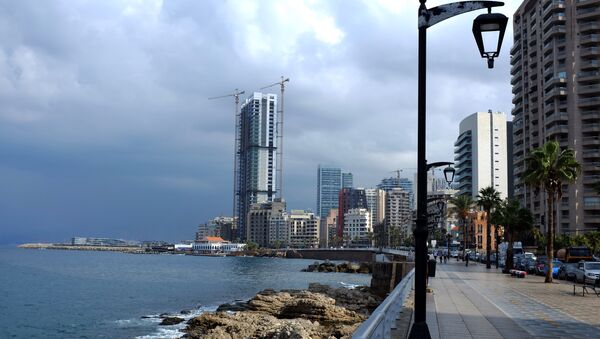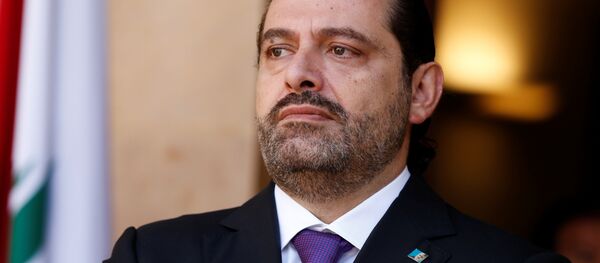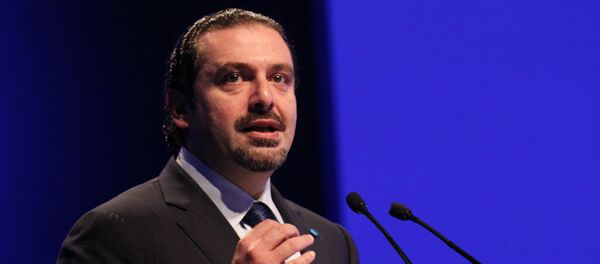MOSCOW (Sputnik) — France is able to contribute to the resolution of the political crisis in Lebanon which was triggered by the resignation of Lebanese Prime Minister Saad Hariri in Riyadh, but cannot do it alone, as it does not have sufficient means to exert direct influence on the sides involved in the crisis, experts told Sputnik.
Strong Ties, Weak Influence
France has historical relations with Lebanon, as the country was under the mandate of the French Republic between World War I and World War II. Thus, Paris is concerned about the political instability in Lebanon that might hurt French interests in the region, experts said.
"Of course France still has political influence in Lebanon… We have the links between French and Lebanese economic and political officials. This is the reality, and we cannot underestimate it," Didier Billion, a deputy director at the French Institute for International and Strategic Affairs (IRIS) and a specialist in Middle East politics, told Sputnik.
"I think that unfortunately France does not have any levers anymore to unblock the critical situation we see in Lebanon now, following the restrained and forced resignation of the prime minister… For a number of reasons, it does not possess the same means either in Lebanon nor in the region, to really influence the situation," Billion pointed out.
READ MORE: French FM Sheds Light on Former Lebanese PM Hariri's Movements After Resignation
The expert explained France's inability to exert real influence in the region by citing "a number of political mistakes" and the lack of defined policy toward the region in the past ten years.
"We can contribute to that, and I think we have a central position to resolve that, but we are not able to do that alone," Billion stressed.
Macron's Visit
Commenting on the visit of the French president to the United Arab Emirates and Saudi Arabia, Billion positively assessed Macron's diplomatic efforts.
"I think he did the right thing by taking this trip to the UAE and then to Saudi Arabia, because we are in a very worryingly critical situation. Even though France cannot influence this crisis alone, if it can contribute to its resolution, it’s good," Billion said.
Thierry Coville, a researcher at IRIS, also lauded the president's trip.
"I think it’s a good thing that the French president made a surprise visit to Saudi Arabia, because this region is in need of a mediator state, which historically was the role of France… France is a country that talks to everyone and contrary to [US President] Donald Trump, doesn’t take sides," Coville told Sputnik.
Billion, however, warned against high expectations from Macron's involvement into the resolution of the Lebanese crisis.
"We need to accept that the French do not have the same room for maneuver as they did 10-15 years ago… It’s a question of whether with Emmanuel Macron we will see the methodical reorientation of French foreign policy, even though he has a stronger stance on that than his predecessors. But he needs to take the existing balance of powers into account, he can’t swing it in several weeks," Billion argued.
Choosing Between Saudi Arabia and Iran
"I think that in foreign policy as well as in domestic policy, you have to set priorities. I don’t think that we can treat all the interlocutors equally. But it would be an absolute mistake to denounce one interlocutor, and support another," Billion pointed out.
The expert stressed, nevertheless, that he believed that it was Saudi Arabia and not Iran undermining the stability in the region, taking into account the situation in Yemen and diplomatic row with Qatar.
"There is one state in the region which is a destabilizing factor, and this is Saudi Arabia, not Iran. Throughout the past years, and especially the past months, it took up many initiatives that proved to be destabilizing in the region, which is chaotic enough," Billion argued.
READ MORE: Macron & Tehran: The French Don't Want to Choose Between Iran and US — Analyst
The IRIS deputy director called on the French leadership to explain to Saudi Arabia that its ongoing rivalry with Tehran was harmful for the region and that Saudi Arabia should review its policy, but he also noted that Paris should maintain good relations with Riyadh.
"We need to be firm regarding our Saudi Arabian partner, explaining to them that its this kind of paranoia regarding Iran which sparks obsession in the Saudi Arabian ruling circle has to stop. But it would be stupid to break our relationship with Saudi Arabia. We need to continue discussions, trying to reason with them," Billion concluded.
Thierry Coville, meanwhile, noted that thanks to its cordial relations with each side, France could use this opportunity to urge Tehran and Riyadh to refrain from turning Lebanon into their battlefield.
"We have had a more normal relationship with Iran since the nuclear deal, we have a historically good relationship with Saudi Arabia, so I think France is in good position to be talking with everybody and try to reduce tensions… The strategy of raising tensions is fruitless. It’s an important initiative to pass the message to Riyadh that it’s out of the question to once again make Lebanon a battlefield between Iran and Saudi Arabia," Coville argued.
On Saturday, the Elysee Palace said that French President Emmanuel Macron will hold a meeting with Lebanese Foreign Minister Gebran Bassil on November 14. According to the statement, Macron has discussed the situation surrounding the resignation of Hariri with Lebanese President Michel Aoun. It comes several days after Macron had informal contacts with Hariri during his trip to the United Arab Emirates and made a surprise visit to Saudi Arabia to discuss the situation in the region and, particularly, the Lebanese crisis.
Hariri announced his resignation in a video address from Riyadh on November 4, expressing fear that he could be assassinated like his father in Lebanon and accusing Tehran and the Iran-backed Hezbollah movement of attempts to destabilize Lebanon and the Middle East in general. Lebanese media reported that Hariri had been forcibly held in Saudi Arabia. Aoun did not recognized Hariri's resignation from Riyadh and called on Saudi Arabia to clarify why the politician had not left the kingdom.




